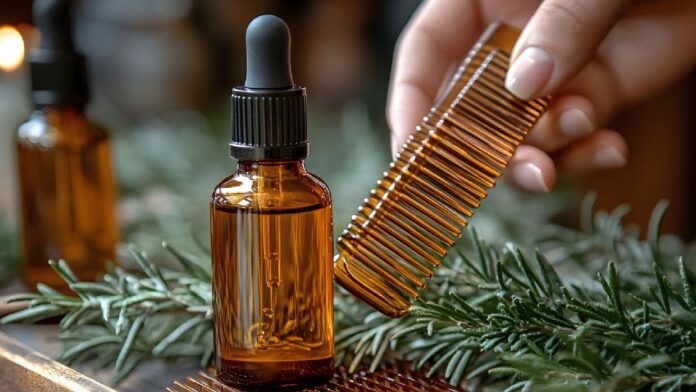Tea tree oil, which has anti-inflammatory and antifungal properties, may offer a solution to people with hair loss. We tell you how to use tea tree oil for hair growth.
Tea tree oil, an essential oil extracted from the leaves of the Melaleuca alternifolia plant, is the go-to home remedy for many people with acne. After all, it has antibacterial and anti-inflammatory properties that are helpful in getting rid of acne, which can pop up on your face, neck, back, shoulders and chest. Apart from skincare, it is also popular in the haircare industry. It can help to combat dandruff and serve as a key ingredient to support healthy hair. But can you use tea tree oil for hair growth? Read on to know what makes this oil effective and how to use it.
Tea tree oil for hair growth: How does it help?
“Tea tree oil does not directly grow hair, like a medicine, but it creates a scalp environment perfect for healthier and stronger hair growth,” says aesthetic physician and cosmetologist Dr Karuna Malhotra. It can particularly promote hair growth when mixed with certain medicines.
During a study, published in Drug Design, Development and Therapy, a mixture of tea tree oil, diclofenac (nonsteroidal anti-inflammatory drug), and minoxidil (medication for hair growth) was found to be more effective than using minoxidil alone in boosting hair growth.

Here are the benefits of tea tree oil for hair growth:
1. Clears blocked hair follicles
“One of the most common reasons for poor hair growth is clogged follicles, which is caused by excess oil (sebum), dandruff, product build-up and dead skin cells,” says the expert. Tea tree oil acts as a natural cleanser for the scalp, and helps to unclog hair follicles and remove residue. This lets hair to grow more freely and in a healthier way.
2. Reduces scalp inflammation
A calm scalp is very important for growth. Inflammation and itching, often due to fungal or bacterial overgrowth, can damage hair follicles. Tea tree oil has strong anti-inflammatory properties, according to research published in The Journal Of Clinical And Aesthetic Dermatology. Its anti-inflammatory properties can help reduce redness and irritation of the scalp, soothe skin and support follicular strength.
3. Fights dandruff
It also has antifungal and antibacterial properties, especially effective against the fungus Malassezia, which is known to cause dandruff. A study, published in Current Cosmetic Science, showed that shampoo with tea tree oil can combat dandruff. “This common hair problem can disrupt hair growth by weakening follicles and causing flaking and scratching,” says Dr Malhotra. Tea tree oil for hair growth can work, as it reduces flaking and microbial overgrowth. This restores the scalp’s natural balance, and promotes better hair growth.
4. Improves blood circulation
When massaged into the scalp with a carrier oil, tea tree oil may help stimulate blood flow. This way it can help to transport more oxygen and nutrients to the hair follicles. “A well nourished follicle is an active follicle, and better blood circulation encourages hair to grow in a healthier, thicker cycle,” says the expert.
You may also like


5. Strengthens hair roots
By improving scalp health, this type of oil strengthens hair at the root and may reduce hair loss due to an infection or inflammation. “Healthy hair follicles mean stronger, healthier hair strands,” she says.
How to use tea tree oil for hair growth?
To use tea tree oil for hair growth, remember to always dilute it before use. It blends well with oils depending on your hair type:
- For oily scalp: Mix it with jojoba oil, as it mimics natural sebum and helps regulate oil without clogging the scalp.
- For dry scalp: Carrier oil like coconut oil or olive oil can work. These nourish the scalp well and reduce dryness when paired with tea tree oil for hair growth.
- For normal hair: Use almond oil, as it is light, and a vitamin E-rich oil that can add shine and strength to your hair.

How to use it:
- Choose the carrier oil according to your hair type.
- Mix 2-3 drops of tea tree oil with 2 tablespoons of the carrier oil of your choice.
- Massage the mixture into your scalp and leave it on for 30 to 60 minutes then wash it off using a mild shampoo.
“You can also add a few drops of tea tree oil to the shampoo or conditioner of your choice,” says Dr Malhotra.
Who should not use tea tree oil for hair growth?
Using tea tree oil for hair growth may not be suitable for:
- People with sensitive skin or eczema, as it may cause irritation on the scalp.
- People allergic to eucalyptus or other plants from the myrtle family should avoid using tea tree oil for hair growth. As they may have a higher possibility of also being allergic to tea tree oil.
- Women who are pregnant and breastfeeding don’t have to avoid it, but should use tea tree oil for hair growth with caution and after consulting a doctor.
Using tea tree oil for hair growth may work by correcting the underlying problems of the scalp like dandruff, infection or inflammation. Like other essential oils, dilute tea tree oil with a carrier oil like coconut or jojoba oil. Also, perform a patch test to avoid any unpleasant reactions.
Related FAQs
Which is better, rosemary oil or tea tree oil?
Tea tree oil is best for scalp infections, dandruff and oily scalp. Rosemary oil is good for stimulating blood flow and encouraging hair growth.
What oil is stronger than tea tree oil?
Oregano oil is considered stronger in antimicrobial strength, but it is too harsh for topical use on the scalp without proper dilution. Tea tree oil offers the right balance for skin and scalp usage.
Can I put 100% tea tree oil in my hair?
No, you should not apply 100% tea tree oil directly to your hair or scalp. Tea tree oil is a powerful essential oil and is highly concentrated. When used in its pure form, it can be too strong for the sensitive skin on your scalp or hair follicles.
What is tea tree oil used for?
Tea tree oil is widely used in natural remedies and personal care. It can treat dandruff and acne and reduce scalp buildup.

